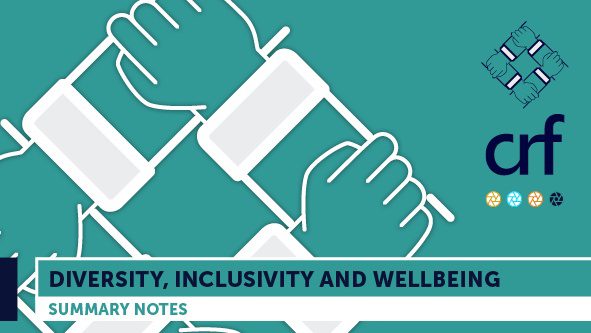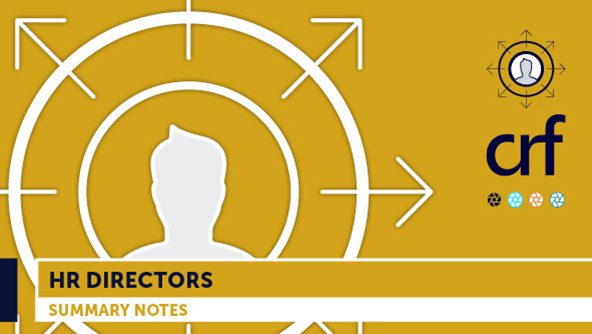D&I and Wellbeing
DIW Summary Notes – Creating a Culture of Care in the Workplace
On January 28th CRF convened an online discussion for its Diversity, Inclusivity & Wellbeing (DI&W) community on the topic of Creating a Culture of Care in the Workplace. During the session, Charlie Beswick, Author and Training Consultant, shared the workplace challenges which carers face and provided practical guidance on how organisations can support carers at work. These notes summarise the presentation and the following discussion.
Definitions and Context
“A carer is anyone, including children and adults, who looks after a family member, partner or friend who needs help because of their illness, frailty, disability, a mental health problem or an addiction and cannot cope without their support.”
While there is overlap between being a carer and general caregiving (such as parenting), key distinctions include that being a carer typically involves providing long-term care, greater levels of personal care and increased involvement in medical decisions.
Carers UK reports that 1 in 7 UK workers are carers, a number that has risen since 2019. However, carers may not share their caring responsibilities with their employer for the following reasons:
- Self-identification. People may not see themselves as a carer (e.g. ‘I’m a daughter, not a carer’). Reframing by asking ‘do you have caring responsibilities?’ can help to overcome this.
- Fear of implications, such as perceived fears of redundancy or difficulties in being promoted.
- An unsupportive manager or culture.
- Feelings of guilt or of being an inconvenience.
- Unclear policies or lack of supportive infrastructure.
Providing a supportive environment for carers offers key business benefits:
- Every day, 600 carers leave employment, with the actual figure likely much higher.
- Carers are highly motivated and skilled employees. Employment provides carers with a crucial outlet and an alternative identity – 70% of carers say work enhances their self-worth, while 60% value it for social interaction.
- A survey of over 200 organisations of varying sizes, conducted by Employers for Carers, found that over 90% reported that supporting working carers improved staff morale, loyalty and retention, while more than half said it led to overall cost savings.
How Can Employers Support Carers?
Positive policies and practices. This should be a living document that is ideally informed by the very people it’s aimed to support.
Educate and empower leaders. Middle managers need to have the skills to handle sensitive and difficult conversations.
Optimise work-life balance. For example, flexible working, hybrid working, compressed hours or time during work hours to make necessary phone calls. Where flexible hours are not possible, adopting a flexible mindset is an option.
Proactive support and tools such as awareness sessions, webinars, a carers passport or paid leave.
Links to relevant resources, such as counselling or signposting healthcare apps and services.
Employee networks or resource groups provide a safe space and common ground for individuals to connect. Consider bringing in additional support for these groups rather than placing extra pressure on those who may not have the time or capacity to take on additional responsibilities.
Rosie Clarke, Principal Consultant at Inclusive Employers, advocated for inclusion passports, highlighting the following:
- Inclusion passports can record various life circumstances, including caring responsibilities. They function similarly to carer’s passports but extend beyond caregiving.
- When someone applies for a carer’s passport, they explicitly declare themselves as a carer. In contrast, inclusion passports can be offered to everyone, allowing individuals to disclose their situation on their own terms.
- Revisiting these every six months can be beneficial, as circumstances change. However, it’s important to check with the individual, as preferences will vary.
Q: How can managers create the right working environment for carers?
A: If employees don’t see their manager as supportive, they won’t feel comfortable sharing that they have caring responsibilities. Taking an interest in the people around you is key – if you don’t know your team or organisation well, they won’t trust you enough to disclose something as personal as their caregiving role.
Encourage open conversations, be receptive to feedback and challenges without becoming defensive, and adopt a co-creation mindset – working with your team rather than imposing rules on them.
Additionally encourage senior leadership team members with caring responsibilities to share their experiences – this can have a significant impact.
Caring and the Law
- Under the Carers Leave Act 2023, carers are permitted to take five planned, unpaid days off a year. However, emergency days off are not covered – employers need to clearly inform carers about where emergency days off can be taken from.
- Through the Employment Relations (Flexible Working) Act 2023, employees also have the right to request flexible working.
- The Neonatal Care (Leave and Pay) Bill will come into force in April 2025 and gives parents the right of up to 12 weeks paid off if their child is in neonatal care.
- Employers also need to consider the risk of disability discrimination by association (e.g. see Follows v Nationwide).
- Carers UK will push for caring to become a protected characteristic under the current government.
Next Steps
- Establish a baseline number of employees with caring responsibilities.
- Set up an employee engagement group.
- Review your current policies and procedures (ideally, in conjunction with your ERG and/or an external company).
Further Resources
CRF. 2023. Team Effectiveness
CRF. 2024. Sustaining Employee Wellbeing
UPCOMING CRF EVENT:
Creating an Inclusive Culture
10 June 2025: 09:00 – 15:30 BST (In person)
17 June 2025: 14:00 – 15:00 BST (Online)
MEMBER LOGIN TO ACCESS ALL CRF CONTENT




